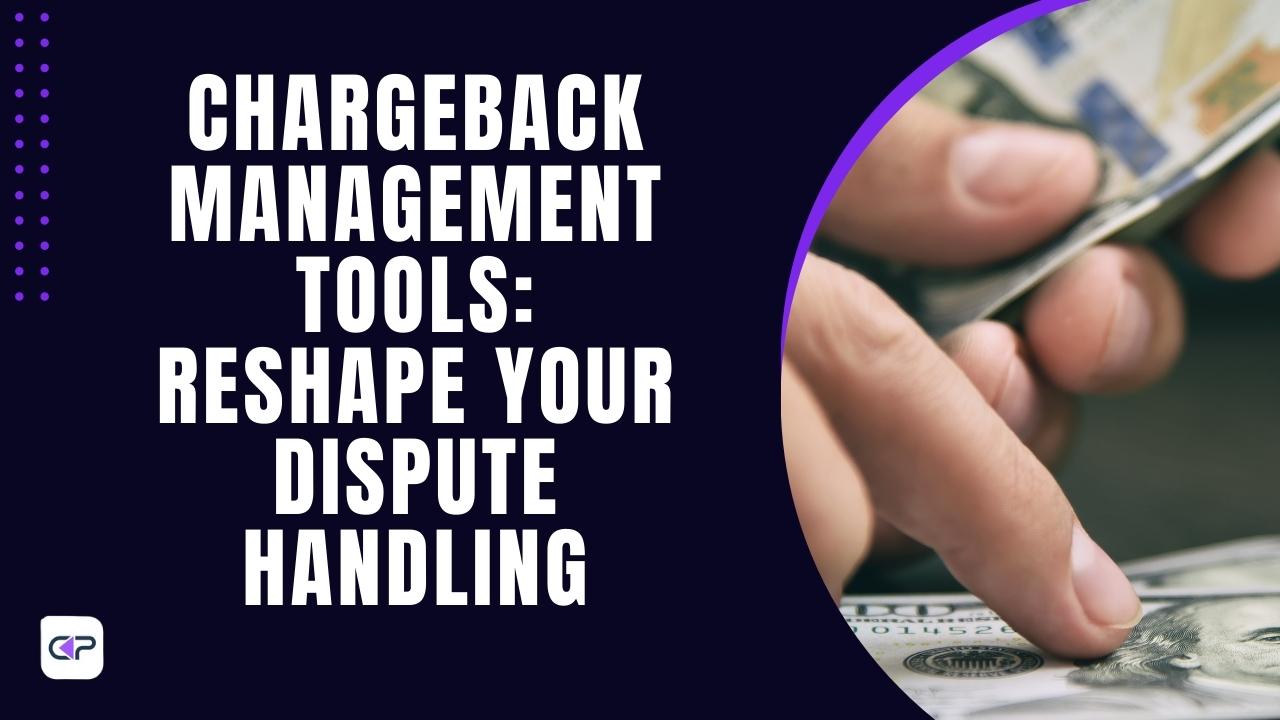
In today's digital economy, chargebacks have become a serious challenge for businesses across multiple industries.
When customers dispute transactions with their banks or credit card issuers, it results in financial losses and impacts merchant-customer relationships.
Effective chargeback management is essential for businesses to minimize revenue loss, maintain financial stability, and uphold credibility with payment processors.
However, managing chargebacks manually is time-consuming, labor-intensive, and prone to data errors.
To tackle such challenges, businesses are increasingly relying on automated chargeback management solutions to streamline processes, enhance efficiency, and maximize revenue recovery.
This article discusses AI chargeback management tools role to handle chargeback disputes and reclaim lost revenue with excellent ROI.
What is Chargeback Management?
Chargeback management is to the process of handling and resolving chargebacks, which occur when a customer disputes a transaction with their bank or credit card issuer.
It involves fighting chargeback disputes to minimize financial losses and maintain platform specific chargeback threshold.
Chargebacks stem from various reasons, including fraudulent transactions, customer dissatisfaction with products or services, billing errors, or unauthorized use of credit cards.
As a result, businesses face financial losses from the disputed transaction and additional chargeback fees by banks and payment processors.
Effective chargeback management involves proactively employing strategies and tools to handle chargebacks, such as robust fraud detection systems, clear communication with customers, and seamless integration with payment gateways.
When chargebacks occur, businesses must promptly respond with evidence to dispute the claim and resolve the issue on time.
By implementing chargeback management practices, businesses will protect their revenue, maintain customer trust, and optimize their operations for sustainable growth.
The Role of Chargeback Management Tools
Chargeback management tools play a crucial role in helping businesses effectively handle, mange, and resolve chargebacks.
These tools leverage advanced technology, such as AI and data analytics, to streamline the chargeback management process and minimize financial losses.
Let's get into the key aspects of how these tools contribute to efficient chargeback management:
1. Detection
Real-time monitoring and alert systems notify businesses of incoming chargebacks, allowing them to take immediate action to investigate the dispute and gather necessary evidence.
By promptly detecting chargebacks, businesses can expedite the resolution process and minimize financial losses.
2. Resolution
Chargeback management tools streamline the dispute resolution process by providing businesses with comprehensive data analytics and evidence compilation capabilities.
These tools automatically gather transaction details, customer communications, and other relevant documentation to build a compelling case against disputed chargebacks.
Furthermore, they facilitate seamless communication with banks and payment processors, enabling businesses to present their cases efficiently and effectively resolve disputes in their favor.
3. Integration
Chargeback management tools seamlessly integrate with existing payment gateways and systems, ensuring smooth operation and minimal disruption to business workflows.
By integrating with payment processors, these tools can access transaction data in real-time and synchronize information across multiple channels.
This integration synergy enhances the accuracy and efficiency of chargeback management processes, allowing businesses to optimize their operations and focus on core activities.
4. Scalability
As businesses grow and transaction volumes increase, chargeback management tools offer scalability to accommodate changing needs and demands.
These tools are designed to handle large volumes of transactions without compromising performance or efficiency.
Whether processing hundreds or thousands of transactions per day, businesses can rely on chargeback management tools to scale seamlessly and adapt to evolving business requirements.
In short, chargeback management tools play a crucial role in helping businesses proactively prevent, detect, and resolve chargebacks.
By leveraging advanced technology, seamless integration, and scalable solutions, these tools empower businesses to protect their revenue, maintain customer trust, and optimize their operations for long-term success.
Read More: AI Based Application for Chargeback Management
3 Types of Chargeback Management Tools
Chargeback management tools come in various forms, each offering unique features and functionalities to suit different business needs.
Here are three common types of chargeback management tools:
1. Fully Managed
Fully managed chargeback management solutions provide businesses with comprehensive support and assistance in handling chargebacks.
These services typically involve outsourcing chargeback management tasks to a third-party provider, who handles the entire process on behalf of the business.
From dispute initiation to evidence compilation and representment, fully managed solutions offer hands-off convenience, allowing businesses to focus on core operations while experts manage chargebacks efficiently.
2. SaaS
SaaS chargeback management tools are cloud-based software solutions that businesses can access and use on a subscription or success basis.
These tools offer a range of features and functionalities for businesses to manage chargebacks independently.
With SaaS solutions, businesses have access to user-friendly dashboards, real-time monitoring, and automation capabilities to streamline chargeback management processes.
SaaS chargeback management tools are scalable, customizable, and cost-effective, making them suitable for businesses of all sizes.
3. Hybrid
Hybrid chargeback management tools combine elements of both fully managed services and SaaS solutions, offering businesses flexibility and customization options.
With hybrid solutions, businesses have the option to outsource certain chargeback management tasks while retaining control over others.
For example, businesses may choose to outsource dispute resolution to a third-party provider while managing evidence compilation and communication internally.
Hybrid solutions offer a tailored approach to chargeback management, allowing businesses to strike a balance between convenience and control.
Features of Chargeback Management Tools
Chargeback management tools are equipped with a range of features designed to empower businesses in effectively handling and mitigating chargebacks.
These features leverage advanced technology and data analytics to streamline the chargeback management process and minimize financial losses.
Let's explore some key features of these tools:
1. Fraud Detection and Prevention
Chargeback management tools utilize AI-powered algorithms to detect fraudulent transactions in real-time.
These tools analyze various transaction parameters and customer behavior patterns to identify suspicious activities and prevent chargebacks before they occur.
By implementing customizable rules and thresholds, businesses can automatically flag and block high-risk transactions, minimizing the risk of fraudulent chargebacks.
2. Real-time Monitoring and Alert Systems
These tools provide businesses with real-time monitoring and alert systems to notify them of incoming chargebacks promptly.
Businesses receive instant notifications when a chargeback is initiated, allowing them to take immediate action to investigate the dispute and gather necessary evidence.
Real-time monitoring enables businesses to stay proactive in managing chargebacks and minimize financial losses.
3. Data Analytics for Pattern Identification
Chargeback management tools leverage data analytics capabilities to identify patterns and trends associated with chargebacks.
By analyzing historical transaction data and customer behavior, these tools can identify recurring patterns that may indicate potential chargeback risks.
This data-driven approach enables businesses to proactively address underlying issues and implement preventive measures to reduce chargeback rates.
4. Integration with Payment Gateways and Systems
Chargeback management tools seamlessly integrate with existing payment gateways and systems to ensure smooth operation and minimal disruption to business workflows.
These tools synchronize transaction data in real time, enabling businesses to access up-to-date information and streamline chargeback management processes.
Integration with payment processors enhances the accuracy and efficiency of chargeback resolution, allowing businesses to resolve disputes more effectively.
5. Evidence Compilation and Documentation
Chargeback management tools facilitate the compilation and organization of evidence required to dispute chargebacks effectively.
These tools automatically gather transaction details, customer communications, and other relevant documentation to build a compelling case against disputed chargebacks.
By streamlining the evidence collection process, businesses can present their case more efficiently and increase their chances of winning disputes.
6. Communication Optimization
These tools enhance communication with banks, payment processors, and customers throughout the chargeback management process.
They provide businesses with communication templates, automated responses, and follow-up reminders to ensure timely and effective communication.
By optimizing communication channels, businesses can resolve disputes more efficiently and maintain positive relationships with customers and stakeholders.
So, chargeback management tools offer a comprehensive suite of features to empower businesses in handling and mitigating chargebacks effectively.
From fraud detection and prevention to real-time monitoring and communication optimization, these tools provide businesses with the capabilities they need to protect their revenue, minimize financial losses, and maintain customer trust.
How much do Chargeback Management Tools Cost?
The cost of chargeback management tools varies based on features, business size, and deployment options.
Here's an overview of potential pricing structures:
1. Free options
Some tools offer basic functionality for free, but they may have limitations such as transaction volume caps or minimal support.
2. Subscription-based pricing
Plans range from $50 per month for basic features to several thousand dollars per month for enterprise-grade solutions.
Pricing tiers often correlate with features and transaction volume, providing scalability for businesses of different sizes.
3. Transaction-based fees
Certain tools charge a small percentage (typically 0.5% - 1.0%) per processed transaction.
This model is suitable for businesses with fluctuating transaction volumes, ensuring costs align with usage.
4. Per-user fees
Enterprise solutions may implement a monthly fee per user accessing the platform. This approach allows businesses to scale tool usage according to their needs while maintaining cost control.
Additionally, some chargeback management tools offer success-based pricing, where fees are tied to the amount of revenue recovered or chargebacks prevented.
This model incentivizes providers to deliver tangible results, aligning costs with the value delivered to businesses.
When evaluating chargeback management tools, consider factors like features, scalability, and success-based pricing to determine the most cost-effective solution for your business needs.

How Chargeback Management Tools Help Recover Lost Revenue?
Chargeback management tools play a crucial role in helping businesses recover lost revenue by implementing proactive measures and leveraging advanced technologies.
Here's how these tools facilitate the recovery of lost revenue:
1. AI Representment
Chargeback management tools utilize AI-powered algorithms to strengthen representment cases and increase the likelihood of winning disputes.
AI algorithms analyze transaction data, customer behavior, and historical patterns to identify compelling evidence that supports the merchant's position.
By automatically compiling relevant documentation and presenting a robust case, these tools improve the chances of recovering lost revenue through successful representment.
2. Machine Learning Algorithms for Fraud Detection
Chargeback management tools leverage machine learning (ML) algorithms to detect fraudulent transaction patterns and prevent chargebacks proactively.
ML algorithms analyze large volumes of transaction data to identify anomalies, trends, and potential indicators of fraud.
By continuously learning and adapting to evolving fraud tactics, these algorithms enhance the accuracy and effectiveness of fraud detection, reducing the occurrence of chargebacks and minimizing revenue loss.
3. Identification of Poor Refund Policies and Loopholes
Chargeback management tools help businesses identify and address poor refund policies and loopholes that may contribute to revenue loss.
These tools analyze customer feedback, transaction data, and refund policies to identify areas where improvements can be made.
By pinpointing instances of excessive refunds, unclear policies, or loopholes that are exploited by fraudsters, businesses can take proactive measures to tighten security measures and minimize revenue leakage.
4. Real-time Monitoring and Alert Systems
Chargeback management tools provide real-time monitoring and alert systems to notify businesses of potential revenue loss situations.
Businesses receive instant notifications when chargebacks are initiated or fraudulent activities are detected, allowing them to take immediate action to investigate the issue and prevent further revenue loss.
Real-time monitoring enables businesses to stay proactive in addressing revenue recovery opportunities and minimizing financial impact.
5. Data Analytics for Revenue Optimization
Chargeback management tools leverage data analytics capabilities to identify revenue optimization opportunities and mitigate future revenue loss.
These tools analyze transaction data, customer behavior, and chargeback trends to identify patterns and insights that can inform strategic decisions.
By leveraging actionable insights from data analytics, businesses can implement targeted interventions to recover lost revenue, optimize pricing strategies, and improve overall profitability.
So, chargeback management tools play a crucial role in helping businesses recover lost revenue by implementing proactive measures, leveraging advanced technologies, and optimizing revenue recovery strategies.
Through AI representment, ML algorithms for fraud detection, identification of poor refund policies, real-time monitoring, and data analytics, these tools empower businesses to minimize revenue loss, protect their bottom line, and maintain financial health.
Fighting Disputes Effectively with These Tools
Chargeback management tools are instrumental in enabling businesses to effectively fight disputes and resolve chargebacks in their favor.
By leveraging advanced technology and streamlined processes, these tools empower businesses to navigate the dispute resolution process efficiently.
Here's how chargeback management tools help businesses fight disputes effectively:
1. Evidence Compilation and Presentation
Chargeback management tools streamline the process of compiling and presenting evidence to dispute chargebacks.
These tools automatically gather transaction data, customer communications, and other relevant documentation, organizing them into a compelling case against disputed chargebacks.
By providing businesses with a centralized platform to manage evidence, these tools simplify the dispute resolution process and increase the chances of winning disputes.
2. AI Algorithms for Case Analysis
Chargeback management tools utilize AI algorithms to analyze dispute cases and identify the most effective strategies for resolution.
AI algorithms assess various factors, such as transaction history, customer behavior, and dispute patterns, to determine the likelihood of success for each case.
By leveraging AI-driven insights, businesses can make informed decisions about which disputes to prioritize and allocate resources accordingly, maximizing their chances of success.
3. Streamlined Communication Channels
These tools facilitate seamless communication with banks, payment processors, and customers throughout the dispute-resolution process.
They provide businesses with communication templates, automated responses, and follow-up reminders, ensuring timely and effective communication at every stage.
By optimizing communication channels, these tools help businesses maintain transparency, resolve disputes efficiently, and uphold positive relationships with stakeholders.
4. Real-time Monitoring and Alert Systems
Chargeback management tools offer real-time monitoring and alert systems to notify businesses of incoming disputes promptly.
Businesses receive instant notifications when disputes are initiated, allowing them to take immediate action to investigate the issue and gather necessary evidence.
Real-time monitoring enables businesses to stay proactive in managing disputes, minimizing financial losses, and preserving revenue.
5. Integration with Case Management Systems
These tools seamlessly integrate with case management systems and CRM platforms, providing businesses with a centralized platform to track and manage dispute cases.
Integration with case management systems streamlines workflow processes, enabling businesses to assign tasks, track progress, and monitor outcomes efficiently.
By consolidating all dispute-related activities into a single platform, these tools enhance productivity, visibility, and accountability in dispute-resolution efforts.
In short, chargeback management tools play a crucial role in enabling businesses to fight disputes effectively and resolve chargebacks in their favor.
Case Studies
Read some case studies on How ChargePay chargeback management tools help businesses in different industries.
Manual Chargeback Management Tools Vs Automated Tools
Manual chargeback management tools involve traditional, labor-intensive processes for handling and resolving chargebacks, whereas automated tools leverage advanced technology to streamline and optimize chargeback management processes.
Let's explore the differences between manual and automated chargeback management tools:
Manual Chargeback Management Tools
1. Labor-Intensive Processes
Manual chargeback management tools rely on manual processes, such as paper-based documentation and manual data entry, which are time-consuming and prone to errors.
2. Limited Scalability
Manual tools may struggle to handle large volumes of chargeback cases efficiently, leading to delays, backlogs, and increased processing times.
3. Lack of Real-Time Insights
Manual tools may lack real-time monitoring and analytics capabilities, making it challenging for businesses to identify and address chargeback issues promptly.
4. Higher Operational Costs
Manual chargeback management requires significant manpower and resources, leading to higher operational costs and reduced profitability for businesses.
5. Increased Risk of Human Error
Manual processes increase the risk of human error, such as data entry mistakes or incomplete documentation, which can negatively impact dispute resolution outcomes.
Automated Chargeback Management Tools
1. Streamlined Processes
Automated chargeback management tools streamline processes through automation, reducing the need for manual intervention and minimizing human error.
2. Scalability
Automated tools are scalable and can efficiently handle large volumes of chargeback cases without sacrificing performance or efficiency.
3. Real-Time Monitoring and Analytics
Automated tools offer real-time monitoring and analytics capabilities, providing businesses with actionable insights to identify chargeback trends, patterns, and potential fraud.
4. Cost-Effectiveness
Automated chargeback management reduces operational costs by minimizing manual labor and resource requirements, resulting in improved profitability for businesses.
5. Enhanced Efficiency and Accuracy
Automated processes improve efficiency and accuracy by automating repetitive tasks, ensuring consistent data entry, and reducing the risk of human error.
In short, automated chargeback management tools offer significant advantages over manual tools in terms of efficiency, scalability, real-time insights, cost-effectiveness, and accuracy.
AI-automated Chargeback Management with ChargePay
ChargePay revolutionizes chargeback management with its AI-driven approach, offering businesses a seamless and efficient solution to combat revenue loss due to chargebacks.
By harnessing cutting-edge AI technology, ChargePay empowers businesses to automatically contest, manage, and win chargeback disputes without the burden of manual effort.
Through its sophisticated AI algorithms, ChargePay analyzes transaction data, customer behavior, and dispute patterns to craft winning representments and respond to chargebacks in real-time, ensuring faster resolution and maximum revenue recovery.
With ChargePay, businesses can unlock unprecedented success in chargeback management, achieving win rates of over 80% while reclaiming up to 3.5 times more revenue previously lost to chargebacks.
ChargePay's AI-powered automation streamlines the entire chargeback management workflow, from detection and analysis to evidence compilation and dispute resolution.
By reclaiming lost revenue while businesses sleep, ChargePay enables them to focus on growth and profitability with confidence, knowing that their chargeback management is in capable hands.
Experience the ChargePay difference today and take charge of your revenue protection effortlessly.







.svg)







.svg)
.svg)
.svg)